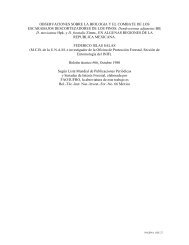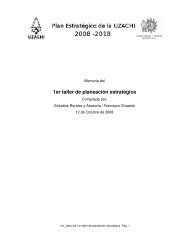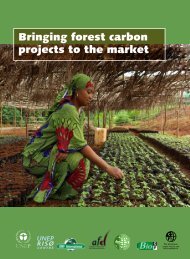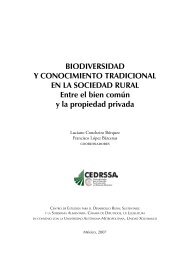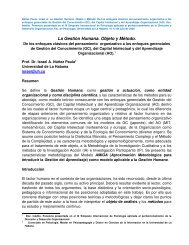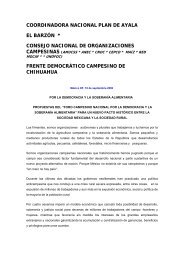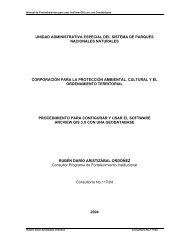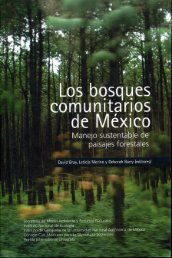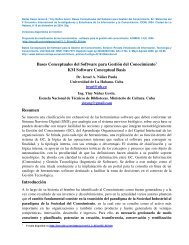STATE OF THE WORLD's INDIGENOUs PEOpLEs - CINU
STATE OF THE WORLD's INDIGENOUs PEOpLEs - CINU
STATE OF THE WORLD's INDIGENOUs PEOpLEs - CINU
- No tags were found...
Create successful ePaper yourself
Turn your PDF publications into a flip-book with our unique Google optimized e-Paper software.
EMBARGOED UNTIL 14 January 2010<strong>STATE</strong> <strong>OF</strong> <strong>THE</strong> WORLD’S INDIGENOUS PEOPLESNot for distributionenvironmental NGOs largely being ignored. Much of this exploitation is carried out by transnationalcorporations, with resource owners getting a very small share of the profits.Climate change: The very existence of small Pacific islands is threatened by climate change. Accordingto the report, “six countries in the Pacific are faced with the threat of seeing islands disappear as a resultof rising sea levels as a direct consequence of global warming”. Livelihoods are being directly affectedby climate change. In Tarawa, Kiribati, for example, salt water intrusion into the water table is causing thedeath of breadfruit trees, affecting an essential component of the local diet.Economic impacts: Governments in the Pacific have been pursuing economic policies that are out of tunewith the characteristics and realities of the economies of these small-island developing States. Pacificeconomies are largely reliant on agriculture and fishing, with large proportions of the population living inrural areas. Despite this fact, governments have pursued free trade policies that favour foreign investment.These policies “encourage foreign control of island economies and create increased dependency onexternally devised economic initiatives, rather than promoting and supporting local initiatives”.Political impacts: The Pacific region has been affected by a series of political crises, notably in Fiji andthe Solomon Islands, fuelled by disparities, land issues and a lack of confidence in Governments. Many ofthese sources of social discontent can be traced to the mixed impact of liberal policies.Source: WCC (2001).Migration and urbanizationFor the first time in human history, the majority of humanity lives in urban areas. Although available data indicatesthat the majority of the world’s indigenous peoples still live in rural areas, there is increasing evidence thatindigenous peoples are part of a global trend towards urbanization, that this trend is irreversible and occurring inboth developed and undeveloped regions. 19 For example, in Latin America, a multi-ethnic and pluricultural regionwith 671 state-recognized indigenous peoples, the majority of indigenous peoples in some countries (Bolivia,Brazil and Chile) reside in urban areas. 20 Likewise, in New Zealand, the Maori are highly urbanized, with over 80per cent now living in major urban centres. 21 In some instances, urban migration is voluntary. It may be spurred bythe prospect of better economic opportunities and the need to ensure survival of the traditional way of life in theirterritories through urban-rural remittances or a desire to be in closer proximity to social services and facilitiesfor education or health. 22 New circumstances associated with globalization have led to an increase in migratoryflows and mobility. 23In other cases, urban migration is involuntary. It may be the result of environmental degradation that has destroyedtraditional livelihoods, dispossession, displacement, military conflict or natural disaster. 24 Common factors that19Message from Ann Tibaijuka, Executive Director of UN-Habitat to the Expert Group Meeting on Urban Indigenous Peoples andMigration, Santiago de Chile, 27-29 March 2007. UNPFII (2007), 32.20Statement by José Luis Machinea, Executive Secretary of the United Nations Economic Commission for Latin America andthe Caribbean to the Expert Group Meeting on Urban Indigenous Peoples and Migration, Santiago de Chile, 27-29 March 2007.UNPFII (2007), 26.21Statistics New Zealand (2007) 3.22UNPFII (2007), 11 and 13.23Statement by José Luis Machinea. UNPFII (2007), 27.24Message from Ann Tibaijuka. UNPFII (2007), 32.EMERGING ISSUES | 231




